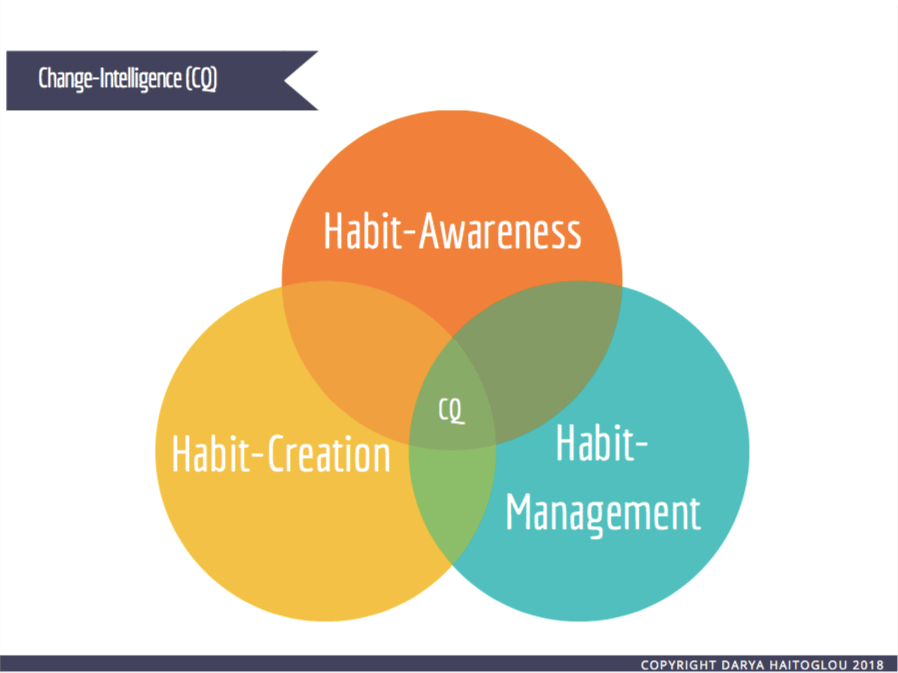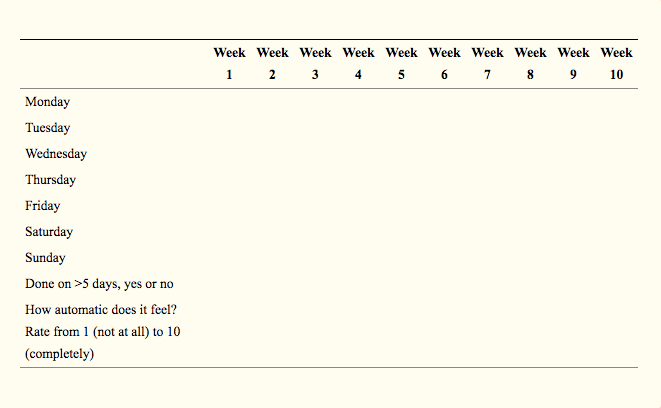How to start a good habit?
How to change a bad habit?
Why motivating yourself doesn’t work to change habits?
How can I stop procrastinating?
If you know me well, I’ve always been interested in what makes people change to create love-rich and blame-free relationships and a fulfilling life. I find it fascinating to see that some people embrace change and thrive in it, while others struggle and fade under a constant pressure of change.
I believe our modern life is fuelled by change-intelligence, that is how quickly we can adapt and change our habits that do not serve us well, and focus on those that do. It’s going to be even more important in the future as the information overload and destructions become a cultural norm.
Change-Intelligence has three components: a) Habit-awareness, b) Habit-creation and c) Habit-management.

First, you become aware of having a habit or wanting to have a habit.
Then, you take the below steps to create a new or change an old habit.
Finally, you keep consistency and below principles to manage your habit to stay with you forever (or as long as you want!)
Take, for example, learning to floss your teeth. First, you realise that by flossing your teeth, your teeth stay healthier longer. You decide to commit to flossing every evening after you brush your teeth. You start flossing one tooth the same evening and you feel good about it. Success! Next day and week, you add one more tooth to floss and celebrate your success by feeling wonderful and sometimes by dancing or having an extra smile.
Why is it so difficult to change, if we know how, you may ask? The short answer is that any change requires breaking up habits and that really is incredibly difficult.
HOW HABITS FORM
Habits are wired in our limbic system that runs past our cognitive control. The whole idea of habit-making is to free-up some brain capacity to focus on other things that matter and maximise efficiency by turning routines into habits. Hence, if you have performed an activity a number of times, your brain has coded it as a routine and hence, it turns it into a habit, so you don’t need to focus on it, but rather do it semi-automatically. That means, as soon as there is a cue (trigger) you make an action and get a reward.
For example, cue: take your car keys, action: sit and drive, reward: arrival at the desired destination.
If it’s that simple, there should be a simple process of programme our mind to create a new habit. And there is!
CHANGE A HABIT LOOP
Here is a simple routine, suggested by my colleagues at University College London, to create a new healthy habit:
1. Decide on a goal that you would like to achieve.
2. Choose a simple action that will get you towards your goal which you can do on a daily basis.
A consistent (ideally daily) basis is one of the most important factors, as it creates a repetition for your limbic system to program a new behaviour faster.
3. Plan when and where you will do your chosen action.
Most people have difficulty to follow a plan because they lack clarity of what needs to happen when and where.
4. Every time you encounter that time and place, do the action (see below some helpful considerations on how to make it work).
5. It will get easier with time, and within 10 weeks you should find you are doing it automatically without even having to think about it.
WRITE A HABIT OATH
My goal (e.g. ‘to exercise daily’, ‘to start with 3 positive thoughts every day’, ‘to drink 2 litres of water before 4pm’, ‘to start with a difficult project 9-11am every day’, ‘ to read 10 pages of a book at 9:30pm’, ‘write 500 words every day after lunch’, etc.) _________________________________________________
My plan (e.g. ‘After brushing my teeth, I will exercise for 20 minutes every day’ )
(When and where) ___________________________ I will ___________________________
Some people find it helpful to keep a record while they are forming a new habit. This daily tick-sheet can be used until your new habit becomes automatic. You can rate how automatic it feels at the end of each week, to watch it getting easier.

Duhigg (2012) brilliantly puts it that neuroscientists have traced our habit-making behaviours to a part of the brain called the basal ganglia, which also plays a key role in the development of emotions, memories and pattern recognition. Decisions, meanwhile, are made in a different part of the brain called the prefrontal cortex. But as soon as a behaviour becomes automatic, the decision-making part of your brain goes into a kind of a sleep mode.
That’s why, changing habits while on holidays or trainings, retreats or workshops away from home and work, is one of the best ways to crack the code of habit-formation.
7 HABIT-PROMOTING CONSIDERATIONS:
1. It helps to be motivated to make a change. If you are not, find a bigger reason to change. Link it to a long-term health benefit or find how it can help someone else to live a better life. Helping other people generally helps our motivation.
2. Find a buddy to make this change happen by proclaiming you are going to do it and ask them to follow up with you on a regular basis. Commitment to someone else helps!
3. Make this change an identity level one. That means, think of what ‘type’ of a person you want to be to have this new habit. E.g. I’m a consistent fit and energetic person and hence I exercise daily to live a healthy long life.
4. Prepare for a set-back. What if you slip off a schedule by travelling somewhere or getting sick? Make a plan to come back on track. It’s going to make a necessary pathway in your brain in case that happens. (e.g. ‘as soon as I come back home, I get back to the routine and I ask my coach to follow up with me’)
5. Don’t follow someone else’s goals or desires. Find your own and genuine ones. Progress towards a self-determined behavioural goal sustains interest much longer.
6. Start with small and meaningful changes and make your way up to larger goals and more complicated tasks afterwards. You want to feel good first and trust you can do it. Don’t trick yourself into failing and ruining the habit-change process.
7. Learn how to celebrate small wins. If you have succeeded to follow the first day – Great!
Followed the second day? Celebrate!
3rd day on track? Amazing!
One week and still going? You are Awesome!!
ARE YOU READY FOR A CHANGE?
Want a FREE Habit-Change Plan to keep you accountable? Write to info@daryahaitoglou.com with a reference ‘Ready for a Habit Change’ and we will be in touch to help you design your habit-change plan and keep you accountable for making it happen. Don’t write if you are not ready to change!
RESOURCES FOR HABIT CHANGE
Duhigg, C. (2012) The Power of Habit: Why We Do What We Do, and How to Change, Random House.
Hull, C.L. (1943) Principles of
Lally, P, Van-Jaarsveld, C.H.M., Potts, H.W.W., Wardle, J. (2010) How are habits formed:
Lally, P., Wardle, J., Gardner, B. (2011) Experiences of habit formation: a qualitative study. Psychol Health Med.; 16(4):484-489. [PubMed]
Neal, D.T., Wood, W., Labrecque J.S., Lally, P. (2012) How do habits guide behaviour? Perceived and actual triggers of habits in daily life. Journal of Experiential Social
Wood, W., Neal, D.T. (2007) A new look at habits and the habit-goal interface. Psychological Rev.; 114(4):843-863. [PubMed]
Wood, W., Quinn, J.M., & Kashy, D. (2002). Habits
So, are you Ready for a Change?
Want a FREE Habit-Change Plan to keep you accountable? Write to info@daryahaitoglou.com with a reference ‘Ready for a Habit Change’ and we will be in touch to help you design your habit-change plan and keep you accountable for making it happen. Don’t write if you are not ready to change!
WANT MORE?
For more information on habit change, check this article: https://daryahaitoglou.com/science-behind-new-year-resolutions-dont-work/
